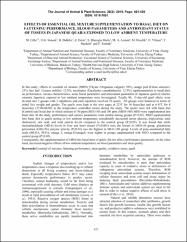Effects of essential oil mixture supplementation to basal diet on fattening performance, blood parameters and antioxidant status of tissues in Japanese quails exposed to low ambient temperature

Göster/
Erişim
info:eu-repo/semantics/openAccessTarih
2018Yazar
Çiftçi, MehmetŞimşek, Ülkü Gülcihan
Dalkılıç, Bestami
Erişir, Zeki
Mutlu, Seda İflazoğlu
Azman, Mehmet Ali
Özçelik, Mehtap
Yılmaz, Ökkeş
Üst veri
Tüm öğe kaydını gösterÖzet
In this study, effects of essential oil mixture (MEO) [Thyme (Origanum vulgare): 50%; orange peel (Citrus sinensis): 25%; bay leaf (Laurus nobilis): 12.5%; eucalyptus (Eucalyptus camaldulensis): 12.5%] supplementation to basal diets on performance, carcass characteristics, some blood parameters and antioxidant parameters in Japanese quails (Coturnix coturnix Japonica) exposed to low ambient temperature were investigated. Totally 90, 15-day-old quail chicks were divided into 3 groups with 3 repetitions and each repetition involved 10 quails. All groups were balanced in terms of initial live weight and gender. The quails were kept in the wire cages at 22 degrees C for 16 hours/day and at 6-8 degrees C for 8 hours/day (22: 00-06: 00) in the temperature controlled rooms during the study. The quails were fed with basal diet (Control) and basal diet in which mixture of 50 ppm (MEO-50) and 100 ppm (MEO-100) MEO were supplemented into basal diet. In the study, performance and carcass parameters were similar among groups (P>0.05). MEO supplemented into basal diet in quails raising in low ambient temperature considerably decreased serum glucose, triglyceride, total cholesterol, uric acid, and total protein levels compared to the control group (P <= 0.05). It was found that while malondialdehyde (MDA) levels in liver and heart tissues (P <= 0.001) were the lowest in MEO-50 group, glutathione peroxidase (GSH-Px) enzyme activity (P <= 0.01) was the highest in MEO-100 group. Levels of poly-unsaturated fatty acids (MUFA, PUFA, omega 3, omega-6/omega3) were higher in groups supplemented with MEO compared to the control group (P <= 0.05). Consequently, the supplementation of MEO into basal diets of quails did not affect performance parameters, on the other hand, decreased negative effects of low ambient temperature on blood parameters and meat quality.

















